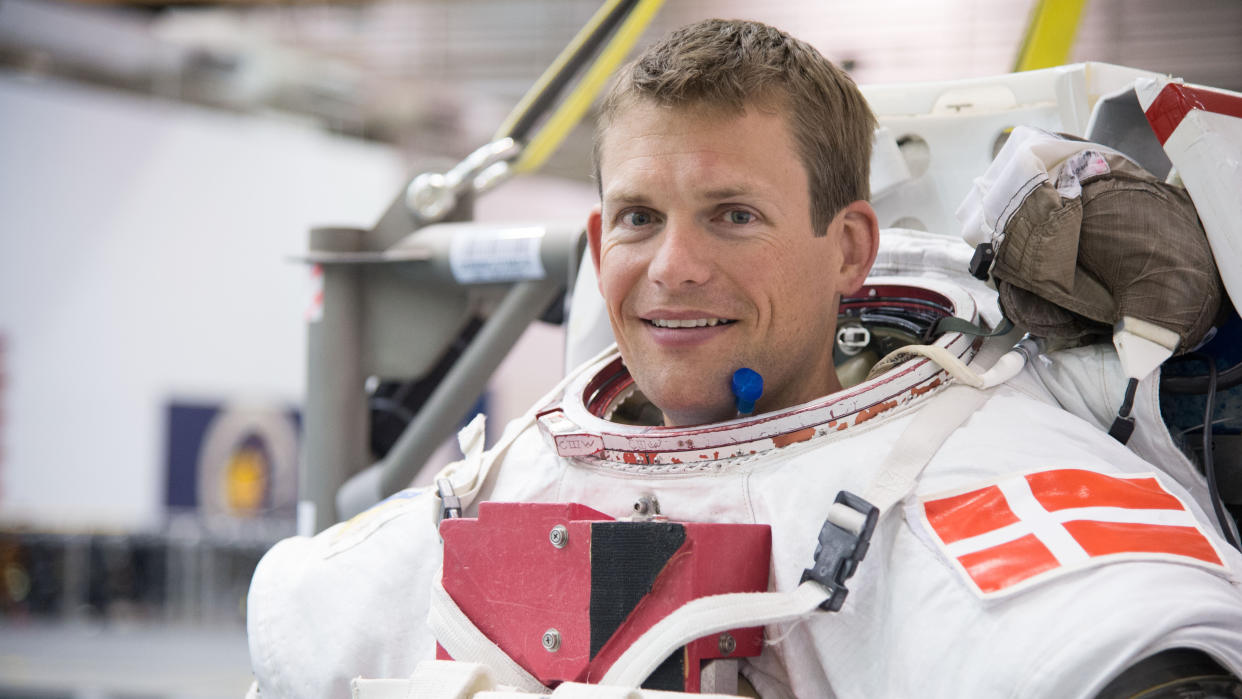A leak on the ISS canceled his spacewalk. But an astronaut says that was the right call

- Oops!Something went wrong.Please try again later.
An astronaut was supposed to make his first spacewalk today (Oct. 12), but it wasn't meant to be.
Andreas Mogensen of the European Space Agency said he supported International Space Station (ISS) managers' decision to postpone the extravehicular activity (EVA) after a leak on the orbiting complex on Monday (Oct. 9). The spacewalk will now run no earlier than Oct. 19.
"NASA will need more time to assess the readiness of the EVA," Mogensen posted on X, formerly known as Twitter, from the ISS on Wednesday (Oct. 11). "I fully support the safety-first approach we always take when it comes to space, even if it means waiting a bit longer to go on our spacewalk."
A leak of ammonia coolant was detected in a backup radiator for the Russian Nauka science module, the third in Russian ISS hardware in a year. The toxic substance has stopped flowing, but NASA managers elected Wednesday (Oct. 11) to postpone the spacewalk as a precaution as the investigation into the cause continues.
Related: International Space Station leaks coolant into space, but astronauts are not in danger
Spacewalk preparations continue, along with hundreds of science experiments and ongoing cargo transfers from Northrop Grumman's robotic Cygnus spacecraft, which is berthed to the ISS, NASA officials wrote on Wednesday.
"The whole crew is doing fine, and we continue our days and performing science and preparing for when we get the go-ahead for the spacewalk," added Mogensen, who is still manifested to go outside at some point alongside NASA astronaut Jasmin Moghbeli, who also has yet to perform a spacewalk. (Moghbeli posted the NASA announcement of the postponement on her own X account.)
A second NASA-led spacewalk, originally set for Oct. 20, is also postponed until Oct. 30. The rare all-woman EVA would have seen Moghbeli, alongside NASA astronaut Loral O'Hara, do an all-woman spacewalk, following the first such excursion in 2019 and two others by the same two NASA astronauts.
NASA and Russia have independent spacewalk planning processes, even using different spacesuits and hardware. Russia's next scheduled spacewalk, on Oct. 25, will still go forward with additional tasks added to examine the leaky radiator and send the results back to Moscow's Mission Control.
RELATED STORIES:
— Track the ISS: How and where to see it
— Russian cosmonauts relocate radiator on International Space Station spacewalk
— Wow! Amazing video shows International Space Station crossing the sun during spacewalk
Nauka's primary radiator continues to work well and cool the module, which arrived at the ISS in 2021. The leaky backup radiator is 13 years old and was (while still functional) transferred to Nauka during an April 2023 spacewalk from another Russian module, called Rassvet.
Two other coolant leaks sprung up on Russian spaceships this past year, which the Russian federal space agency Roscosmos blamed on likely micrometeroid strikes. The first was a December 2022 leak in a Soyuz spacecraft built for astronauts. The situation required delaying that crew's trip home from the ISS by six months, until a replacement Soyuz in September 2023 with relief astronauts was ready.
The second leak arose in February 2023 leak in a Progress cargo spacecraft.
The delayed U.S. spacewalks both mostly concern minor maintenance matters, science experiments and an experimental robotic arm ride for Mogensen using ground operators at the controls instead of an astronaut. The robotic work is meant to test procedures for future moon missions under NASA's Artemis program, which plans to land people as soon as 2025 or 2026.
This story was updated Oct. 13 8:06 a.m. EDT with the newly announced dates for the spacewalks, and with an amendment concerning the all-woman spacewalk.

